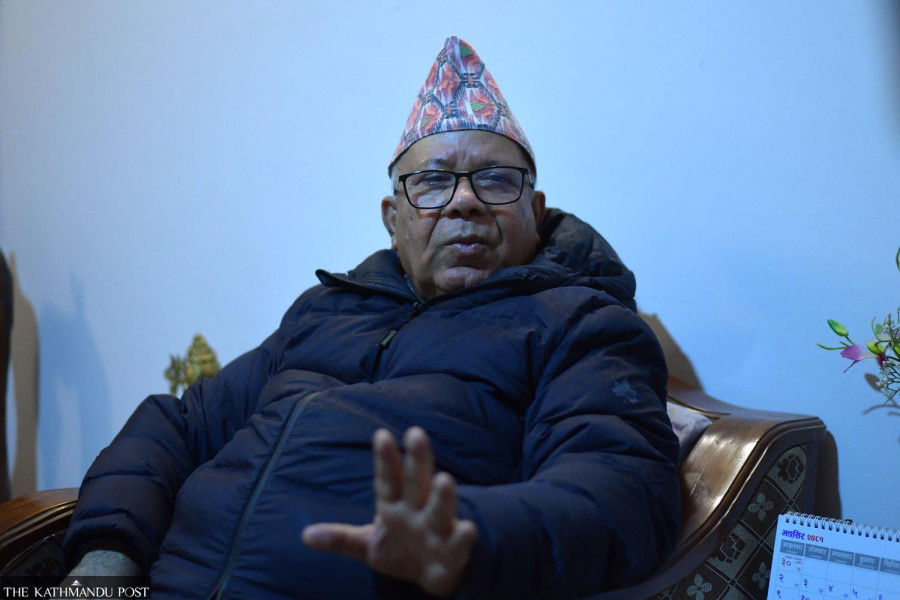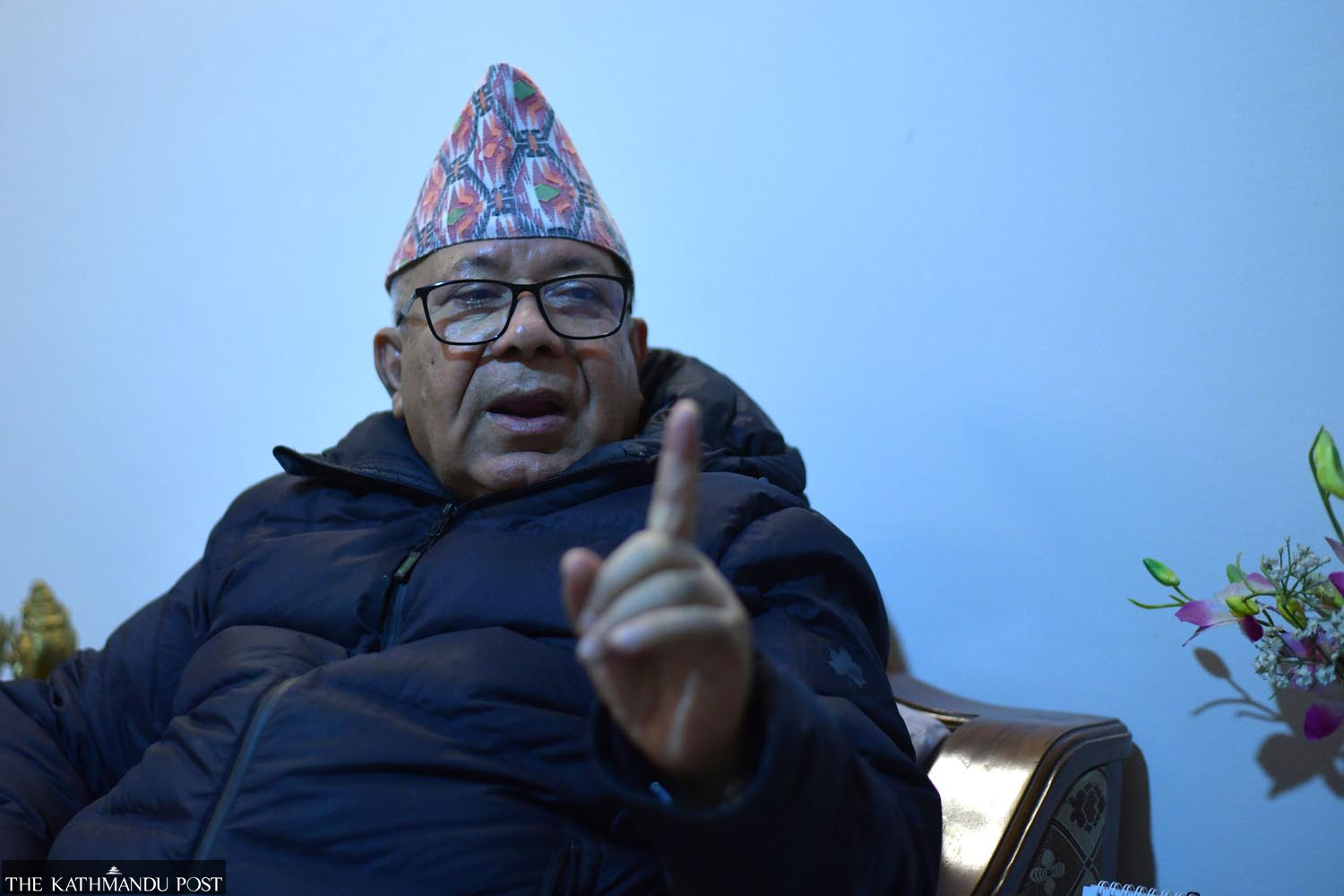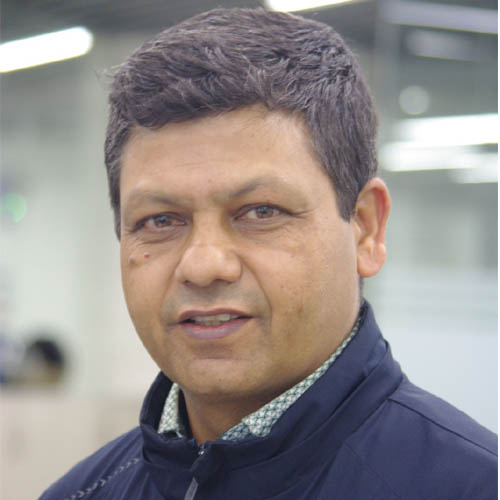Interviews
There is no possibility of reunification with UML
No need to be suspicious about the BRI. We have to focus on how to derive maximum benefits from its projects.
Thira Lal Bhusal
The CPN (Unified Socialist) was formed in August 2021 by a group of dissident CPN-UML leaders including two former party chiefs and ex-prime ministers—Madhav Kumar Nepal and Jhala Nath Khanal. The party, which has 10 seats in the federal lower house is struggling with organisation building, re-elected Nepal as party chief in July. The Post’s Thira Lal Bhusal sat down with Chairman Nepal to hear his assessment of the new party’s three years and his future plans for it.
How do you review the first three years of your party?
First, we have to start with the question of if the formation of this party was necessary. We made the absolutely right move by revolting [against the CPN-UML leadership’s actions]. We foiled the attempts to trample on the constitution and stopped the autocratic, regressive, rightist and individualistic tendencies from prevailing in Nepali politics. Our moves have been politically, legally as well as constitutionally justified, with even the Supreme Court validating them. After that, we displaced the then [KP Sharma Oli-led] government, and brought national politics on the right track. We then formed this party.
Politics doesn’t always go in a straight line. In politics, you face ups and downs, twists and turns and sometimes turbulence. Those who are powerful today could become weak and may disappear over time. Weaker forces may get stronger. Some of our friends say, “Our revolt was right but joining the coalition was wrong”. But it was the need of the time. It is true that we committed some mistakes and couldn’t get enough proportional representation (PR) votes in federal and provincial polls in 2022. We were unnecessarily flexible while making seat allocations with other coalition partners in a number of constituencies. We also strongly opposed the proposals of coalition partners in certain constituencies and fought on our own strength and won seats.
For instance, the CPN (Maoist Centre) didn’t cooperate with us in my own constituency in Rautahat. They didn’t vote for us. But I still won. We fought elections in some palikas [local units] on our own and won majority seats there. But in certain areas our local leaders couldn’t properly negotiate with other partners. Now we should neither be over-reliant on the election coalitions nor do we need to criticise it. Others will recognise us only if we increase our strength. We have had mixed experiences in the past three years. We should be encouraged and optimistic about the future.
But our observation from outside is that your party failed in the elections. It couldn’t even secure national party status and you have done poorly on the organisation front as well.
The situation would be drastically different had all the friends who were initially with us remained active with firm commitment. Some friends lost confidence. Therefore, we couldn’t perform as per the expectations. But our party has produced exemplary results in Madhes Province. We were doing well in Rautahat district even until the latest by-polls. My activeness has never diminished and I have left no stone unturned in terms of inspiring other leaders. But everyone should actively work to build a party. Some people talk big but don’t take responsibility.
You touched on what went wrong in terms of securing PR votes. Could you elaborate?
Our situation would be much better had we fielded more candidates, at least in provincial seats. Our party chapters and members would have been more active in the constituencies if our candidates were in the field. The Janata Samajbadi Party Nepal made a smart move in this connection. The JSP fielded more candidates for provincial seats. From the start, JSP leaders used to wonder in coalition meetings about how they would get PR votes if their candidates aren’t in the constituencies. As our party members joined the campaigns for common candidates of the coalition, they couldn’t ask for votes in our party’s election symbol ‘pen’ in the PR category. Had we mobilised separate teams to campaign for the PR votes, we could have easily crossed the threshold for PR seats in the House of Representatives.
Don’t you think the party is top-heavy with senior leaders while failing to attract new faces?
We have no dearth of leaders or cadres. But we have a problem in mobilising them. In our party, the monitoring and evaluation system is weak. You can’t make one answerable unless you have an evaluation system in writing. Therefore, this time we have assigned responsibilities for just a year. Now they have to submit periodic reports of activities in their respective committees. We became too lenient and didn’t punish those who didn’t work.
You led a huge organisation in the UML for one-and-half decades. But you appear to be struggling to fix issues in this relatively small organisation.
See, people are becoming more selfish, self-centered and lazy. So, we have to make our evaluation system strong. As we have a strong organisation and the right ideology and values, we should now launch pro-people movements and connect with the public.
Do you think the party failed to attract and mobilise people due to its continuous engagement in the government since formation and lack of attractive agenda?
We don’t lack agendas. We have identified and enlisted many issues directly linked to the people’s livelihood in our political paper. We failed to reach the doorsteps of the people. For instance, if there is violence against a woman, our women chapter should immediately reach there. Likewise, the student wing should actively work for the rights of students.
Some of our friends say we shouldn’t have stood in favour of endorsement of the MCC [Millennium Challenge Corporation’s compact]. They argued it was being implemented to encircle our neighbour China and establish a military base in our country. We suspected the same. But our country had already signed on to that. Different interpretations of the concept related to the project emerged. Some described it as a part of the Indo-Pacific Strategy. When we studied the matter, we found CPN-UML chair KP Oli was all set to endorse the compact without any changes in the text, bypassing us. Oli put forward five conditions for that before then prime minister Sher Bahadur Deuba. The conditions included impeaching Speaker Agni Sapkota for not taking action against us [UML had demanded that the Speaker strip 14 lawmakers who quit UML to form the new party of their positions], scrapping our party’s registration in the Election Commission and removing us from the coalition. But Deuba ji stood against that. Then, we found a middle way, which was to endorse the compact with a 12-point explanatory note. So that was the right decision.

The government earlier this month signed the framework for the Belt and Road Initiative (BRI) cooperation agreement with China. What is your view on this?
It is natural to take it [BRI] forward as we have implemented the MCC of the US and have joined hands with other countries and multilateral agencies to carry out our development activities. The projects to be built under the BRI have no strategic or military connections and are based on mutual benefit. So there is no need to be suspicious and we have to focus on how to take maximum benefits from projects under the BRI.
Just a few days ago, you met and talked to Bamdev Gautam, who appears ready to join your party. What is the progress on this?
He has said he is ready to join and accept our party’s decisions. We are discussing this. He has played an important role in critical political junctures. He strongly supported me during the second People’s Movement in 2006. A political party needs such leaders. We are thinking of concluding this process [of welcoming him] soon.
What about Bhim Rawal joining the party?
Unhappy with the party leadership, he has been inactive in the UML but he has not made up his mind to join our party.
Is finalising Gautam’s hierarchy and role in the party taking time?
There won’t be an issue in the case of Bamdev ji. But overall, the number of leaders in our party is big. In the Chinese Communist Party, there are only seven members in the Politburo Standing Committee and 17 members in Other Politburo Members. But there are 24 members in our party’s central secretariat, 41 in the standing committee and 108 members in the politburo. Those who get a candidacy in the election celebrate but those who don’t get a ticket become inactive. Some others fight for ministerial posts. Yet others complain about not getting a ‘lucrative’ ministry. We have to manage them all.
What about reunifying the party with the UML or the Maoist Centre? Many say leaders are more comfortable with the Maoist Centre but party cadres are for rejoining the UML.
Most of our cadres are from the UML background. That might have played a role. But at present there is no possibility of our reunification with the UML. Also, the situation isn’t right to forge unity with the Maoist Centre.
It is said that there is pressure from party members for reunification with the UML?
That’s not true. There is a negative view about us in the UML and therefore our party rank and file wouldn’t be ready to surrender. Some might be lobbying for entry into the UML for personal benefits. Even if some join the UML, it won’t be easy for them there.
But some noted leaders such as Ram Kumari Jhakri who had strongly supported you in the course of building this party have said that the Unified Socialist can’t run like this and that it is better to merge with the UML?
I also enquired about her remarks but she said her intent had been misunderstood. But I repeat that there is no possibility of unity with the UML. We studied the possibility of unity with the Maoist Centre but concluded that we can’t accept Maoism and we also found their election symbol inappropriate. So the process has stopped. For now, we will concentrate on strengthening our own party.
How is the Unified Socialist different from the UML?
Our’s is a policy-driven party and not leader-centric. Committee system prevails in our organisation, not the leader’s orders. We discard rightist approaches and follow revolutionary ideas. We don’t see these qualities in the UML. Only our party has a policy of ‘Socialism with Nepali Characteristics’. We prioritise our agenda based on justice, fair distribution, production and good governance. There was a period when socialism stressed only on equality and therefore some termed it a distribution of poverty but we believe socialism as a principle of prosperity. Capitalism focuses only on profits even at the cost of people’s lives and wars but socialism values people’s lives and livelihoods. So, we are clearly against capitalism and in favour of socialism. But there are different forms of capitalism. We are for promoting national capitalism and eliminating comprador capitalists. We need to invite and welcome foreign investment to increase production in the country.
Your party held its general convention in July first week and it took months to elect other office bearers and assign roles and responsibilities. Why?
It shouldn’t have happened. Some wrong elements entered our party. Some showed immaturity by raising the issue of ‘new generation’. That spoiled the situation. Building a party is not easy. It calls for many things including ideological clarity, capacity to lead the organisation efficiently and an accepted personality. We have to learn from this episode and remove the mistrust that cropped up in this course.




 13.12°C Kathmandu
13.12°C Kathmandu




.jpg&w=200&height=120)







